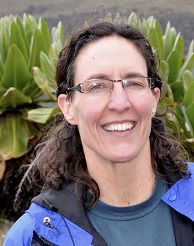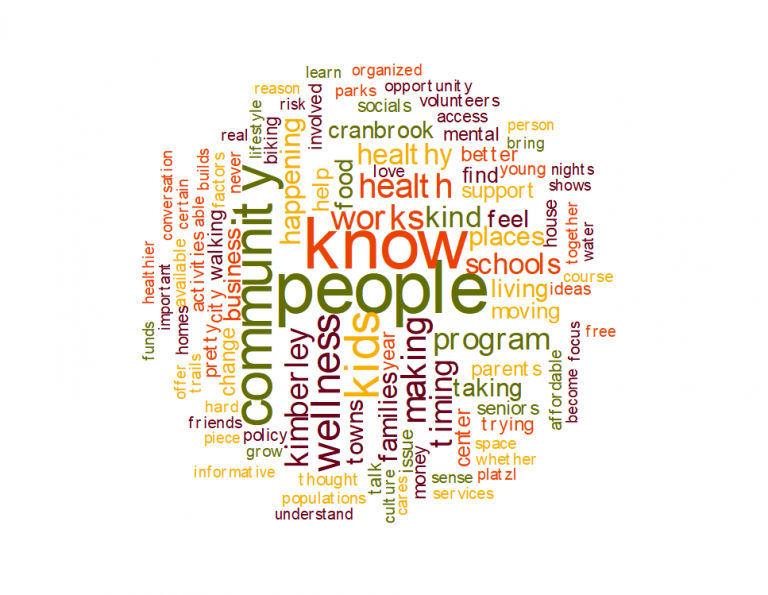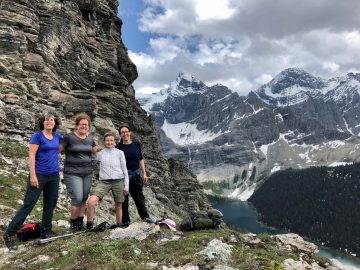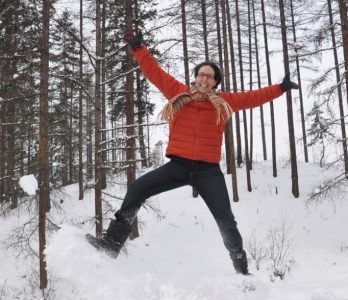 In this Spotlight, we are excited to feature Dr. Ilona Hale, an Assistant Clinical Professor at UBC, Director of the Rural Scholars Program, and a family physician in Kimberley, BC! She shares with us her passion for research and community-based health promotion.
In this Spotlight, we are excited to feature Dr. Ilona Hale, an Assistant Clinical Professor at UBC, Director of the Rural Scholars Program, and a family physician in Kimberley, BC! She shares with us her passion for research and community-based health promotion.
Thank you Ilona for participating in this interview, we are really excited to have you on and learn more about the work you do. Could you start off by telling us a little bit about yourself?
Thank you, Evonne. As you know, I’m a family physician in Kimberley, and a Clinical Assistant Professor at the UBC Department of Family Practice. I’ve also recently been appointed the Director of the Rural Scholars Program.
Are there any current research project(s) you are working on? If not currently involved, what are some research projects you hope to be involved in or ideas you wish to explore?
There are two main streams of research I’m working on right now – the rural research is all related to rural health promotion and disease prevention through our community-based charitable non-profit. Among other things, we are working on a project exploring the factors that make some small rural communities healthier than others. The project has now expanded to other communities with a medical student collecting qualitative data in Sparwood and Meritt. One of our next steps includes collecting quantitative data to see whether or not they support the qualitative findings.
My main research area is all about starting chronic disease prevention really early on – focusing on the early years of life from 0-2 years old. We’ve finished a qualitative study with parents of infants asking them how they felt about current messaging around health information provide to them. This informed a pilot study investigating interventions for health promotion strategies during the first years of life (i.e., 0 – 2 years old). We are now working with the Ministry of Health and the Childhood Obesity Foundation planning another pilot study with a slightly different intervention prior to doing a larger randomized controlled trial to test the interventions that we develop.
In your opinion, why is research important in the rural health context?

We often miss that rural lens in research and health planning. Researchers from outside a rural area who try to design or transplant projects to be implemented rurally lack the context, connections and continuity which are essential to designing and implementing strategies, and creating effective policies for rural populations. For example, rural researchers who do a project in their own community are typically invested in the outcome and interested in what will happen in the long term. This is more likely to lead to effective research leading to tangible changes and ultimately improved health for the people involved.
So many programs that are designed for health promotion are often done in bigger cities and do not apply to smaller communities. Every small community is so unique – the solutions need to come from within, or we will not find answers that effectively address challenges within the community.
What inspired your interest in rural health research?
My inspiration comes from my passion for the topics I research. I have been a family physician for 25 years and almost every day in clinical practice, I run into questions I cannot answer. We know a lot, but there is still a lot we do not know. Those questions start to build up, especially in the area of prevention and health promotion. So many of the conditions we face are, in theory, preventable but we are not preventing them. This is counter-intuitive and really sort of frustrating. How can we change this? I realize that in order for things to change, sometimes it takes evidence to convince policy makers but sometimes it also takes a lot of passion, time, energy and commitment from someone who really cares about the topic. I think it’s important to work towards addressing some of the research gaps to further our understanding and then use this to make changes that will hopefully get us a bit closer to where we want to be.
What kinds of gaps have you encountered in your clinical practice in rural communities relating to health promotion and prevention?

One of the gaps was that it seemed we were starting health promotion education too late – once unhealthy habits or even chronic diseases were already there. The idea for this research originally came from the public health nurses on our team. They were the ones who said, “If you want to prevent disease, you need to start teaching these parents right from the minute the child is born about healthy habits.” When we reviewed the literature, it appeared that this seemed to be true yet research on this idea is just beginning. Worldwide there has been very little research on this topic which is a huge gap. When we did qualitative research interviewing parents, they often expressed the desire to learn more about health promotion earlier because once you start doing something, it’s often difficult to change later. What I see in practice is that parents already know what they should be doing but there are a lot of pressures that prevent them from doing it.
Parents told us that the messages we are using right now to educate and promote healthful behaviors among parents are not particularly helpful and can create feelings of guilt. Our patient-oriented research is focused on realistic interventions that support parents in understanding and learning how to feed their kids and not just what to feed them.
Do you have any tips for health professionals who are just getting started with research? Is there anything you think a novice researcher should know?
There are a lot of clinicians out there with great ideas for research –being with patients all day makes it easy for us to come up with really relevant questions – but they may not be sure what to do with the ideas. I would encourage them to think about whether research might be right for them. I would warn them that research can be harder than it looks and it takes a lot of time and energy but at the same time it is fascinating and rewarding and can be a really interesting and different kind of intellectual challenge; a nice change from clinical practice. You also need a lot of support from experienced people and programs such as the Rural Scholars Program and Clinician Scholars Program are great opportunities to get those supports and resources to conduct research. Most of the challenges I had were around how to do research. My Clinician Scholars Program mentors really helped me learn how to navigate the research process. I want to do research well and I have formed connections with people out there who can help me make that possible.
As we are approaching the end of this interview, we would like to leave it on a fun note! What would you say are your favorite indoor and outdoor activities?

Well, choosing outdoor activities is easy as I have lots of them – that’s one of the many reasons I love to live rurally. But if I had to choose my favorite, it would be backpacking! There are beautiful mountains everywhere I look and I love to be out exploring them. As for indoor activities, that is a great question because I don’t do a lot of stuff inside actually. I would almost have to say research, but I won’t say it. And I don’t think petting my cats counts as an indoor hobby. I just joined a choir so I would say at the moment, it would be singing! Fun fact is I am an alto. What I didn’t recognize was how hard it can be being in a choir. Especially being an alto when you don’t get to sing the melody, but I am really loving it.
Is there anything else you would like to share?
I would like to direct readers to the information about the Rural Scholars Program and encourage them to share it with anyone who might be interested. It is a great opportunity for practicing rural clinicians from any profession to protect some time to explore a research area that interests them.
Thank you, Evonne, for giving me this opportunity to share some of my story.


